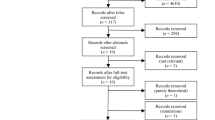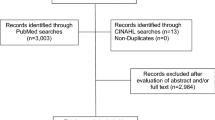Abstract
Purpose
The aim of this study is to examine predictors of cancer-related financial difficulties and work modifications in a national sample of cancer survivors.
Methods
Using the 2011 Medical Expenditure Panel Survey and Experiences with Cancer Survivorship Supplement, the prevalence of financial difficulties and work modifications was examined. Logistic regression and survey weights were used to model these outcomes as functions of sociodemographic and health covariates separately among survivors in active treatment and survivors under age 65 years.
Results
Among all survivors, 33.2 % reported any financial concern, with 17.9 % reporting financial difficulties such as debt or bankruptcy. Among working survivors, 44.0 % made any work modification and 15.3 % made long-term work modifications (e.g., delayed or early retirement). Among those in active treatment, predictors of financial difficulty included: race/ethnicity other than white, non-Hispanic [OR = 8.0; 95 % CI 2.2–28.4]; income <200 % of federal poverty level (FPL) [OR = 15.7; 95 % CI 2.6–95.2] or between 200 and 400 % of FPL [OR = 8.2; 95 % CI 1.3–51.4]; residence in a non-metropolitan service area [OR = 6.4; 95 % CI 1.6–25.0]; and good/fair/poor self-rated health [OR = 3.8; 95 % CI 1.0–14.2]. Among survivors under age 65 years, predictors of long-term work modifications included good/fair/poor self-rated health [OR = 4.1; 95 % CI 1.6–10.2], being married [OR = 2.2; 95 % CI 1.0–4.7], uninsured [OR = 3.5; 95 % CI 1.3–9.3], or publicly insured [OR = 9.0; 95 % CI 3.3–24.4].
Conclusions
A substantial proportion of cancer survivors experience cancer-related financial difficulties and work modifications, particularly those who report race/ethnicity other than white, non-Hispanic, residence in non-metropolitan areas, worse health status, lower income, and public or no health insurance.
Implications for cancer survivors
Attention to the economic impact of cancer treatment is warranted across the survivorship trajectory, with particular attention to subgroups at higher risk.


Similar content being viewed by others
References
NCI. Dictionary of cancer terms. http://www.cancer.gov/dictionary?cdrid=450125 Accessed November 12 2014.
Mariotto AB, Yabroff KR, Shao Y, Feuer EJ, Brown ML. Projections of the cost of cancer care in the United States: 2010–2020. J Natl Cancer Inst. 2011;103(2):117–28. doi:10.1093/jnci/djq495.
Arozullah AM, Calhoun EA, Wolf M, Finley DK, Fitzner KA, Heckinger EA, et al. The financial burden of cancer: estimates from a study of insured women with breast cancer. J Support Oncol. 2004;2(3):271–8.
Banegas MP, Yabroff KR. Out of pocket, out of sight? An unmeasured component of the burden of cancer. J Natl Cancer Inst. 2013;105(4):252–3. doi:10.1093/jnci/djs641.
Tang DH, Alberts DS, Nevins R, Sullivan S, Skrepnek GH. Health care expenditures, hospitalizations, and productivity associated with cancer in US employer settings. J Occup Environ Med Am Coll Occup Environ Med. 2012;54(12):1453–60. doi:10.1097/JOM.0b013e31827943e0.
Zafar SY, Peppercorn JM, Schrag D, Taylor DH, Goetzinger AM, Zhong X, et al. The financial toxicity of cancer treatment: a pilot study assessing out-of-pocket expenses and the insured cancer patient’s experience. Oncologist. 2013;18(4):381–90. doi:10.1634/theoncologist.2012-0279.
Finkelstein EA, Tangka FK, Trogdon JG, Sabatino SA, Richardson LC. The personal financial burden of cancer for the working-aged population. Am J Manag Care. 2009;15(11):801–6.
Dowling EC, Chawla N, Forsythe LP, de Moor J, McNeel T, Rozjabek HM, et al. Lost productivity and burden of illness in cancer survivors with and without other chronic conditions. Cancer. 2013;119(18):3393–401. doi:10.1002/cncr.28214.
Shankaran V, Jolly S, Blough D, Ramsey SD. Risk factors for financial hardship in patients receiving adjuvant chemotherapy for colon cancer: a population-based exploratory analysis. J Clin Oncol. 2012;30(14):1608–14.
Ramsey S, Blough D, Kirchhoff A, Kreizenbeck K, Fedorenko C, Snell K, et al. Washington State cancer patients found to be at greater risk for bankruptcy than people without a cancer diagnosis. Health Aff (Project Hope). 2013;32(6):1143–52. doi:10.1377/hlthaff.2012.1263.
Guy Jr GP, Ekwueme DU, Yabroff KR, Dowling EC, Li C, Rodriguez JL, et al. Economic burden of cancer survivorship among adults in the United States. J Clin Oncol Off J Am Soc Clin Oncol. 2013;31(30):3749–57. doi:10.1200/jco.2013.49.1241.
Azzani M, Roslani AC, Su TT. The perceived cancer-related financial hardship among patients and their families: a systematic review. Support Care Cancer Off J Multinational Assoc Support Care Cancer. 2014. doi:10.1007/s00520-014-2474-y.
Kent EE, Forsythe LP, Yabroff KR, Weaver KE, de Moor JS, Rodriguez JL, et al. Are survivors who report cancer-related financial problems more likely to forgo or delay medical care? Cancer. 2013;119(20):3710–7. doi:10.1002/cncr.28262.
Meneses K, Azuero A, Hassey L, McNees P, Pisu M. Does economic burden influence quality of life in breast cancer survivors? Gynecol Oncol. 2012;124(3):437–43. doi:10.1016/j.ygyno.2011.11.038.
Sharp L, Carsin AE, Timmons A. Associations between cancer-related financial stress and strain and psychological well-being among individuals living with cancer. Psycho-Oncology. 2013;22(4):745–55. doi:10.1002/pon.3055.
Weaver KE, Rowland JH, Bellizzi KM, Aziz NM. Forgoing medical care because of cost: assessing disparities in healthcare access among cancer survivors living in the United States. Cancer. 2010;116(14):3493–504. doi:10.1002/cncr.25209.
Shih YC, Ganz PA, Aberle D, Abernethy A, Bekelman J, Brawley O, et al. Delivering high-quality and affordable care throughout the cancer care continuum. J Clin Oncol Off J Am Soc Clin Oncol. 2013;31(32):4151–7. doi:10.1200/JCO.2013.51.0651.
Ekwueme DU, Yabroff KR, Guy Jr GP, Banegas MP, de Moor JS, Li C, et al. Medical costs and productivity losses of cancer survivors—United States, 2008–2011. MMWR Morb Mortal Wkly Rep. 2014;63(23):505–10.
Guy Jr GP, Yabroff KR, Ekwueme DU, Smith AW, Dowling EC, Rechis R, et al. Estimating the health and economic burden of cancer among those diagnosed as adolescents and young adults. Health Aff (Project Hope). 2014;33(6):1024–31. doi:10.1377/hlthaff.2013.1425.
Yabroff KR, Dowling E, Rodriguez J, Ekwueme DU, Meissner H, Soni A, et al. The medical expenditure panel survey (MEPS) experiences with cancer survivorship supplement. J Cancer Surviv Res Pract. 2012;6(4):407–19. doi:10.1007/s11764-012-0221-2.
AHRQ. Medical Expenditures Panel Survey background. http://meps.ahrq.gov/mepsweb/about_meps/survey_back.jsp. Accessed November 5 2014.
CDC. MEPS experiences with cancer survivorship supplement. http://www.cdc.gov/cancer/survivorship/what_cdc_is_doing/meps.htm. Accessed November 5 2014.
AHRQ. http://meps.ahrq.gov/survey_comp/hc_response_rate.jsp. Accessed November 5 2014.
National Cancer Institute. http://appliedresearch.cancer.gov/meps/meps_fact_sheet.pdf. Accessed November 5 2014.
Yabroff KR, Lund J, Kepka D, Mariotto A. Economic burden of cancer in the United States: estimates, projections, and future research. Cancer Epidemiol Biomark Prev. 2011;20(10):2006–14.
Bhandari A, Wagner T. Self-reported utilization of health care services: improving measurement and accuracy. Med Care Res Rev. 2006;63(2):217–35.
Meropol NJ, Schrag D, Smith TJ, Mulvey TM, Langdon Jr RM, Blum D, et al. American Society of Clinical Oncology guidance statement: the cost of cancer care. J Clin Oncol Off J Am Soc Clin Oncol. 2009;27(23):3868–74. doi:10.1200/jco.2009.23.1183.
Irwin B, Kimmick G, Altomare I, Marcom PK, Houck K, Zafar Y, et al. Patient experience and attitudes toward addressing the cost of breast cancer care. Oncologist. 2014. doi:10.1634/theoncologist.2014-0117.
de Souza JA, Wong YN. Financial distress in cancer patients. J Med Person. 2013;11(2). doi:10.1007/s12682-013-0152-3.
Bestvina CM, Zullig LL, Rushing C, Chino F, Samsa GP, Altomare I, et al. Patient-oncologist cost communication, financial distress, and medication adherence. J Oncol Pract Am Soc Clin Oncol. 2014;10(3):162–7. doi:10.1200/jop.2014.001406.
Moriates C, Shah NT, Arora VM. First, do no (financial) harm. JAMA J Am Med Assoc. 2013;310(6):577–8.
Henrikson NB, Tuzzio L, Loggers ET, Miyoshi J, Buist DS. Patient and oncologist discussions about cancer care costs. Support Care Cancer. 2014;22(4):961–7.
Bullock AJ, Hofstatter EW, Yushak ML, Buss MK. Understanding patients' attitudes toward communication about the cost of cancer care. J Oncol Pract. 2012;8(4):e50–8.
Sommers R, Goold SD, McGlynn EA, Pearson SD, Danis M. Focus groups highlight that many patients object to clinicians’ focusing on costs. Health Aff. 2013;32(2):338–46.
Conflicts of interest
The authors declare they have no conflicts of interest.
Funding
No funding was received for this research.
Author information
Authors and Affiliations
Corresponding author
Rights and permissions
About this article
Cite this article
Whitney, R.L., Bell, J.F., Reed, S.C. et al. Predictors of financial difficulties and work modifications among cancer survivors in the United States. J Cancer Surviv 10, 241–250 (2016). https://doi.org/10.1007/s11764-015-0470-y
Received:
Accepted:
Published:
Issue Date:
DOI: https://doi.org/10.1007/s11764-015-0470-y




